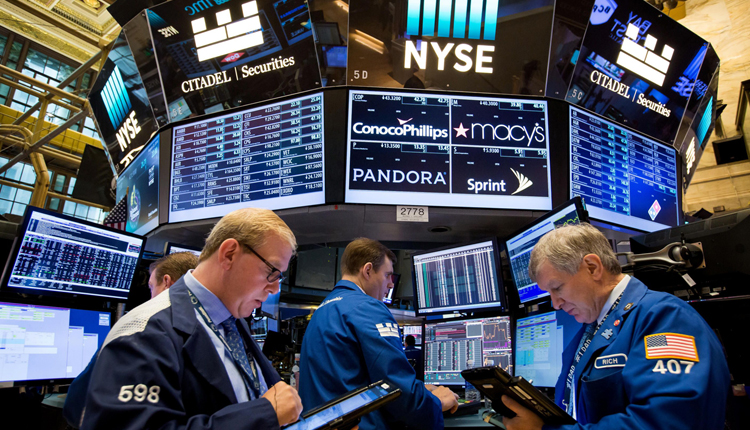U.S. stocks fell Friday as geopolitical fears following President Donald Trump’s move to cancel a key summit with North Korea weighed on solid corporate earnings.
The Dow Jones industrial average dropped 58.7 points to finish at 24,753.09, led lower by losses in Chevron and Exxon Mobil. The S&P 500 declined 0.24 percent to finish at 2,721.33, amid continued losses in energy and financial stocks.
Both sectors had been under pressure this week as a decline in oil prices weighed on industry leaders like Exxon Mobil and Chevron, which closed down 3.5 percent Friday. Lower interest rates, meanwhile, dragged on bank stocks.
U.S. West Texas Intermediate crude futures fell $2.83, or 4 percent, to settle at $67.88 on Friday after several headlines suggested OPEC and non-OPEC members could increase supply. Russian Energy Minister Alexander Novak met with his Saudi counterpart, Khalid Al-Falih, in St. Petersburg to discuss current output caps.
The move Friday represented WTI crude’s worst day since July 2017; oil is off more than 7 percent from recent highs above $72.
The rate on the benchmark 10-year Treasury note has fallen roughly 15 basis points since Monday; it was last seen at 2.93 percent.
The Federal Reserve’s May meeting minutes released this week showed the central bank may be willing to let inflation run a little hotter than its two percent goal. A pivot to safer asset classes in the wake of geopolitical concerns has also helped send rates lower.
“I think we’re facing a situation akin to that in 2008, when we had the Fed saying the economy was very strong,” said Komal Sri-Kumar, president of Sri-Kumar Global Strategies. “Despite the fiscal stimulus from the tax cuts, the optimism is not reflected in the bond market.”
“The other thing I would say concerns the Fed minutes – the Fed blinked. That was the beginning of the downturn this week,” he added. “The Fed tried to make up for it up by saying that they would allow inflation to rise above its target … [but] the Fed never admits to an error.”
The Nasdaq composite was largely unchanged between gains in Netflix and Apple and losses in Facebook and Cisco. Trading volume across the U.S. was below its recent trend this week as traders leave Wall Street ahead of the long weekend. Markets will be closed Monday for the Memorial Day holiday.
A string of solid earnings reports helped keep equities on track for weekly gains, as Foot Locker added to the optimism on Friday.
The athletic shoe retailer handily beat Wall Street expectations, posting adjusted earnings per share of $1.45 versus expectations of $1.24 per share. It posted revenue of $2.03 billion, also ahead of estimates.
The company’s stock closed 20 percent higher Friday.
“At the end of the day, it’s going to come down to earnings and the ability of companies to beat,” said Jeremy Klein, chief market strategist at FBN Securities. “Things are quiet ahead of the holiday … [but] there’s nothing to suggest corporate earnings in the next couple quarters will be any less impressive.”
Several other S&P 500 components also gave investors reason for optimism throughout the week, including home improvement retailer Lowe’s.
Though the Mooresville, North Carolina-based company missed expectations for the first quarter on Wednesday, its stock rose more than 10 percent after it maintained its annual financial targets.
Shares also rallied after famed hedge fund manager Bill Ackman revealed a $1 billion stake in the company; the stock closed up more than 12 percent for the week.
High-end jeweler Tiffany & Co., meanwhile, had one of its best weeks on Wall Street.
The company’s stock surged more than 23 percent after reporting that same-store sales rose 7 percentin the quarter, overshooting expectations of only 2.6 percent. It also raised its full-year guidance in light of the solid beat.
The New York-based company suggested its comeback plan is working to retain price-conscious millennial shoppers from drifting to new competitors. The stock closed 2 percent higher Friday, and is up 25 percent this week.
The generally buoyant sentiment following the earnings numbers was tempered after President Trump’s abrupt decision to scrap a landmark summit with North Korean leader Kim Jong Un. The meeting would have been the first face-to-face encounter between a sitting U.S. president and a North Korean premier.
In response, Pyongyang’s vice foreign minister said the country still hoped for a “Trump formula,” before adding the Asian nation would remain open to resolving long-standing issues with the world’s largest economy. This helped market sentiment to recover Friday morning with European stocks posting solid gains.
The Stoxx Europe 600 rose 0.1 percent Friday, while the Korean Kospi lost 0.2 percent.
U.S. stocks finished lower on Thursday on the news of the canceled summit in Singapore. The Dow Jones industrial average fell 75 points to finish at 24,811.76 by the closing bell, well off a 280-point drop immediately after Trump’s statement.
New orders for U.S.-made capital goods increased more than expected in April, hinting that business spending on equipment was accelerating after a slowdown toward the end of the first quarter.
The Commerce Department said Friday that orders for nondefense capital goods excluding aircraft, a closely watched proxy for business spending plans, jumped 1 percent last month. Economists polled by Reuters had forecast core capital goods orders rising 0.7 percent last month.
Overall orders for durable goods, items ranging from toasters to aircraft that are meant to last three years or more, dropped 1.7 percent in April.
Source: CNBC


